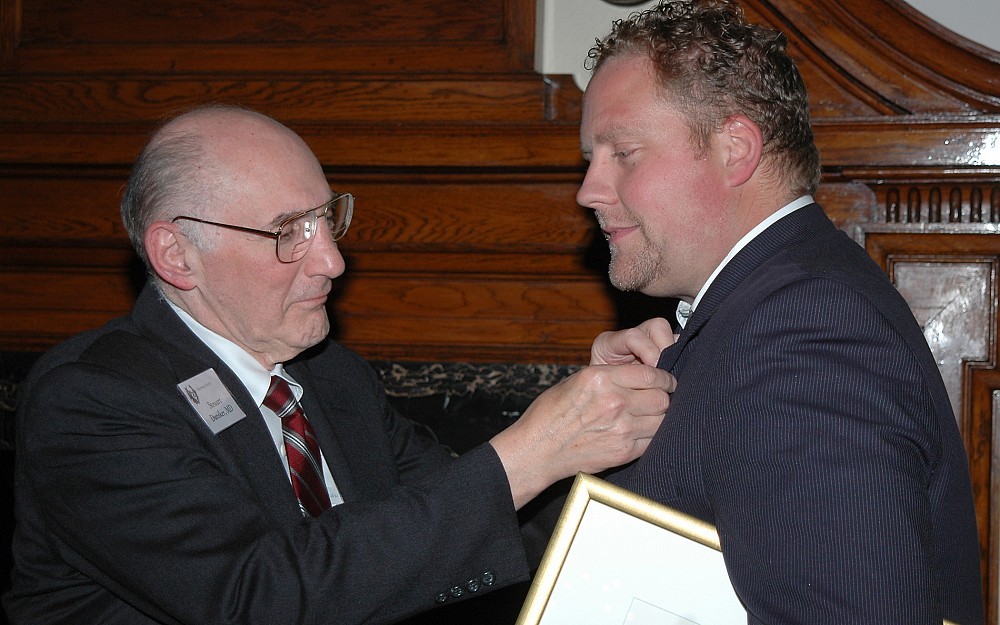
Review of Costs Incurred by Unhelmeted Motorcyclists Earns Resident Inaugural Dunsker Award
CINCINNATIAndrew Losiniecki, MD, a third-year resident in the department of neurosurgery at the University of Cincinnati (UC) College of Medicine, is the inaugural winner of the Ellen and Stewart B. Dunsker, MD, Award for Clinical Research.
Losiniecki, who has a special interest in neurotrauma and neurocritical care, won the $2,000 annual prize with a paper titled, Costs of the non-helmeted motorcyclist: neurological injuries and socioeconomic losses. The study was a retrospective chart review of 120 motorcycle-related admissions to University Hospital in 2004.
Losiniecki concluded that, Compared with helmeted riders, the riders without helmets have higher mortality and morbidity rates and incur larger hospital costs that are more often transmitted to taxpayers and local communities. Our data support the need for increased public awareness regarding the benefit of helmets and mandatory helmet use legislative reform.
Co-authors were Lori Shutter, MD, associate professor of neurosurgery/neurology and director of neurocritical care, and Raj Narayan, MD, Frank H. Mayfield Professor and chair of the department of neurosurgery. Narayan and Shutter are affiliated with the Mayfield Clinic and the Neuroscience Institute at UC and University Hospital.
The annual award is intended to spur clinical research among neurosurgical residents. Dunsker, professor emeritus of neurosurgery, and his wife underwrite the prize, which will be given each spring to a resident who has proposed and completed the most compelling clinical research project during the academic year.
We are off to a great start, says Narayan. This award will provide added incentive to our residents to advance knowledge in our field.
University Hospital, which has the Cincinnati regions only level-1 trauma center, is in a good position to study motorcycle-related injuries, Losiniecki says. Referrals come from all three states (Ohio, Kentucky and Indiana), and none has a universal helmet law. All of the serious injuries come through here.
During our review we looked at a years worth of data and tried to tease out lists of motorcyclists who were admitted to University Hospital who had been wearing helmets and those who had not been wearing helmets. We looked at financial costs and socioeconomic costs. The difference between wearing a helmet and not wearing a helmet was quite significant. Hospital stays were a lot longer for unhelmeted motorcyclists, and hospital costs for these motorcyclists were nearly two to one. Virtually all patients we saw who were wearing helmets left the hospital to go home, while those without helmets either died or went to a nursing facility.
Specifically, Losiniecki reported that among motorcyclists brought to University Hospital with injuries:
· Head injuries occurred in 47 percent of those without helmets, compared with 8 percent of those who wore helmets.
· All helmeted riders with head injuries were discharged home. Of the riders without helmets, only 30 percent went home with or without home therapy, 39 percent went to rehabilitation, 11 percent went to nursing homes, and 21 percent died.
· Hospital costs averaged $23,700 for helmeted riders who suffered head injuries, compared with $67,700 for riders who were not wearing helmets.
· All helmeted riders with head injuries had private insurance; of those not wearing helmets, 33 percent with head injuries had no insurance or were covered by Medicare or Medicaid.
· Injury to the spinal column or spinal cord occurred in 23 percent of the helmeted riders, compared with 29 percent of riders who were not wearing helmets.
Dunsker, who retired as professor of neurosurgery in 2002 after a 31-year career with the Mayfield Clinic, played a role in developing spinal surgery into a subspecialty of neurosurgery. He was named Ohio Neurosurgeon of the Year in 1992 and received the Harvey Cushing Medal, the highest honor bestowed by the American Association of Neurological Surgeons, in 2003. He remains a familiar figure at department meetings and grand rounds.
Judging the 2008 entrants were Jeffrey Keller, PhD, director of the division of education in the department of neurosurgery, and Charles Kuntz IV, MD, and Andrew Ringer, MD, both associate professors of neurosurgery.

Raj Narayan, MD
Related Stories
WVXU: A look at alcohol, de-alcoholized wine and everything in...
May 7, 2024
The University of Cincinnati's Michael Schoech joined Cincinnati Edition for a panel discussion about current rates of alcohol consumption and the growing number of non-alcoholic alternatives.
Cincinnati Enquirer: UC students win Flying Pig races
May 6, 2024
University of Cincinnati students won championships in the 2024 Flying Pig Marathon, including the women's marathon and men's and women's half marathons, the Cincinnati Enquirer reported.
Washington Post: The hour after leaving day care is a...
May 6, 2024
The Washington Post highlighted research led by University of Cincinnati and Cincinnati Children's Hospital researchers that found kids eat fewer healthy foods and take in 22 percent of their day’s added sugar intake in the single hour after they’re picked up from child care.
